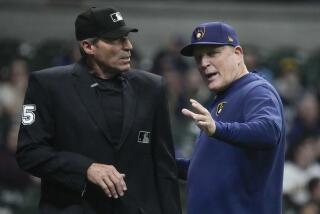Dream Comes True, He Winds Up Blue : Tim Tschida, 26, Achieved Goal: He Is Youngest Umpire in the Majors
- Share via
Like most of his high school buddies in St. Paul, Minn., Tim Tschida went to his share of baseball games at Metropolitan Stadium each summer.
But he wasn’t a die-hard Twins fan. In fact, he wasn’t that interested in the players or the games.
Instead, Tschida was intrigued by the men in the light blue shirts and black pants who were stationed behind the catcher and near each base--the guys who, it seemed, were always arguing with the managers or being screamed at by the fans.
The umpires.
Tschida studied their every move. He watched how they called particular plays. When a ball was hit to the outfield with men on base, he noticed how the umpires reacted and where they positioned themselves for a call.
He saw how umpires handled the many hostilities they encountered.
While his friends dreamed of becoming the next Harmon Killebrew or Rod Carew, Tim Tschida longed to be the next Ron Luciano or Harry Wendelstedt. Some of his friends couldn’t quite understand why.
“I guess it’s kind of like growing up and wanting to be a street sweeper,” Tschida said. “They wondered why in the world anyone would want to do it.”
Not anymore. At 26, Tschida is the youngest umpire in the major leagues. Since he was called up to work American League games in July 1985, he has found his job enjoyable, challenging and dynamic.
“And I’d be less than honest if I said I don’t mind having five months off every year,” he said.
It figured that Tschida would be in the big leagues by now. He began umpiring youth games when he was 13. By the time he was 16, he was working varsity high school games. At 18, he was umpiring college games in the Big 10 Conference.
Tschida planned to attend college and then umpire school, but after two years at the College of St. Thomas in St. Paul, he realized he wasn’t doing what he wanted to do.
So, in 1981, he went to St. Petersburg, Fla., and took the five-week course at American League umpire Joe Brinkman’s school. He spent two years as an umpire in the Class-A California League and then was promoted to the Double-A Southern League.
About four months into the 1983 season, major league umpire Steve Palermo had to have knee surgery, and Tim Welke was moved from Triple-A to the American League. That created an opening in the Triple-A American Assn., and Tschida got the call.
He spent about two years at the Triple-A level before being called up to the American League last year.
“It was a little bit of ability and a lot of luck,” Tschida said of his quick ascension to the big leagues.
Tschida isn’t a member of a regular crew. He spends the season filling in for umpires who are on vacation and works with a different group every two weeks.
Major league umpires usually work one series and then go on to another city, so they actually travel about twice as much as the players. Tschida returns to Anaheim on Aug. 11 to work the Angels-Twins series.
“For me to jump in a plane and go from Kansas City to Seattle is like some people getting in their car and going to the store,” Tschida said. “Traveling becomes part of your life style, but we go first class.”
On the field, umpires are treated more like lost baggage. They’re verbally kicked around by players, coaches and fans.
Tschida said he hasn’t had any major problems, yet. But, of course, anything short of a physical assault is just another day at the office for him.
“The job is conducive to making yourself unpopular sometimes,” Tschida said. “But nobody holds a gun to your head. If you don’t like it or can’t handle it, you’re free to go. Some days, it’s like any job. It can get to you.”
It can be even tougher for a rookie umpire. They may call close plays just like a veteran, but because they haven’t established credibility, managers usually complain more when it’s a rookie making the call.
“They test me on things they wouldn’t test a 10-year veteran on,” Tschida said. “Your credibility comes from experience.”
And experience comes when you learn from your mistakes. For instance, Tschida said, the best way to learn how to make calls at first base is by missing a few.
“After a while, you get tired of being yelled at, so you figure you’ll get it right next time and make it easier on yourself.”
But no matter how good an umpire becomes, he’ll always be considered the enemy by players, coaches and fans. He’ll always be the bad guy on the field.
Tschida always is amazed when he and his fellow co-workers meet people away from the game, and they discover that these umpires aren’t such bad guys after all.
“People are surprised to find out that, No. 1, we are from the planet earth,” he said. “No. 2, if you took 60 major league umpires and put them in the same room, there would be some incredible humor in there, because I don’t think you can do this job without a sense of humor.”
More to Read
Go beyond the scoreboard
Get the latest on L.A.'s teams in the daily Sports Report newsletter.
You may occasionally receive promotional content from the Los Angeles Times.










